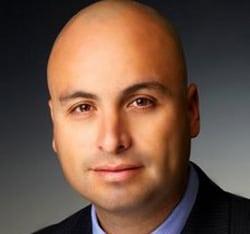
State Auditor Hector Balderas
Balderas says board members, employees were using agency money ‘as their own private ATM cash machine;’ King says he’s still reviewing January 2009 report
State Auditor Hector Balderas has made public a January 2009 special audit of the Region III Housing Authority that identified “considerable violations” of the state per diem law and other problems.
Those violations by Region III and a related entity, Housing Enterprises, Inc. (HEI), include board members collecting per diem “when official meetings did not take place,” collecting per diem beyond what is allowed by law and collecting it twice for attending meetings held on the same day and in the same place.
Other questionable expenses include Region III paying for the wives of two former employees currently under indictment to travel with their husbands to Las Vegas, Nevada, even though auditors found “no evidence” that the trip benefited or was “related to the mission of” Region III.
It’s difficult to calculate exactly how much misused money is identified in the audit, which looked at expenses from 2005 and 2006, but it appears to be in the range of tens of thousands of dollars.
“Members were using these funds as their own private ATM cash machine,” State Auditor Hector Balderas told NMPolitics.net. He called that “the final insult” in a scandal that already includes indictments against four people.
You can read the full audit here.
AG is ‘reviewing the document’

Gary King
Many of the issues identified in the newly released audit haven’t been made public before and aren’t part of the criminal case Attorney General Gary King has brought against former employees accused of fraud, money laundering and other felonies.
The issues that led to King’s indictments of former employees of the Albuquerque-based Region III authority – Director Vincent “Smiley” Gallegos, accountant Dennis M. Kennedy, bond attorney Robert Strumor and attorney David N. Hernandez – led to the collapse of much of the state’s affordable housing system in 2006 and reform to try to clean up the mess.
Gallegos, Strumor and Kennedy are facing the fraud and money laundering charges. Hernandez faces a felony charge of tampering with evidence. All have pleaded not guilty. (Read a primer on the housing authority scandal here.)
But the AG has yet to attempt to seek recovery of the lost funds identified in the special audit, even though his office has had the report for 25 months – since January 2009. King spokesman Phil Sisneros said his office is “reviewing the document,” but said he can’t comment further about the housing authority case because it’s pending.
‘New Mexicans deserve accountability’

Joseph Cervantes
In the meantime, Rep. Joseph Cervantes, D-Las Cruces, is sponsoring legislation that would allow the state auditor to contract with outside counsel to try to recover misused funds identified in this and other audit reports.
“Stealing money intended to help shelter lower income families deserves our strongest condemnation, and an aggressive effort to recover those public funds,” Cervantes said. “This theft was pervasive. Now that we have this accounting, New Mexicans deserve accountability.”
“I am working to provide the auditor with tools to recover the misappropriated public funds, and to restore public trust and confidence in our state government,” Cervantes said.
The audit findings
Several of the state’s regional housing authorities collapsed in 2006 after Region III defaulted on $5 million on bonds it owed the state. At the time, the Legislature and governor charged Balderas’ office with compiling an accounting of the financial status of the housing authorities.
To get a full picture, Balderas’ office had to perform a number of annual audits several of the regional housing authorities had failed to complete in the years leading up to the collapse. Those audits were released to the public in January 2009.
The special audit was completed at the same time, but it was kept secret in accordance with state law because Balderas referred it to the AG and FBI.
More than two years later, in response to a records request from an agency that was given oversight over Region III, the auditor’s office decided enough time had passed to consider the audit a public record, said Evan Blackstone, the state auditor’s general counsel.
Most of the findings contained in the audit have never before been made public. Among them:
- Region III and HEI – an entity Gallegos created to be the construction arm of the housing authorities – had some of the same board members, and members were inappropriately collecting per diem twice when meetings were held on the same day and in the same location.
- Board members and employees were collecting per diem in excess of what is allowed under state law – $114 per day instead of the maximum allowed at the time, $95.
- Board members also inappropriately collected per diem “when official board meetings did not take place and overnight stays did not occur,” the audit states.
- There were several “questionable payments and reimbursements,” including “purchases of alcohol, payments for private club dues,” and the trip to Las Vegas.
Under state law, those who violate the Per Diem and Mileage Act must repay the state “in an amount twice the excess payment.” There’s no additional criminal penalty.
More details on the audit
The allegedly misused money identified in the audit appears to add up to at least tens of thousands of dollars. For example, the audit states, Region III and HEI board members were given a combined $45,213 in per diem “when an official meeting did not take place and an overnight stay did not occur.” In addition, some board members of one entity received per diem for attending a meeting of the other entity’s board as a guest – even though they weren’t on that board.
The audit identifies unlawful per diem payments to individual board members. The board member receiving the largest unlawful amount was Filo Sedillo, who the audit states was “unlawfully paid $10,886.” Several board members were found by auditors to have received much smaller unlawful totals, with the smallest being $114.
One issue that has been made public before, but that’s also in the audit: Gallegos was reimbursed twice for the same business trips – once by Region III and once by HEI. The total he was paid was nearly $46,000, the audit states. It calls the double payments a “significant” violation of the Per Diem and Mileage Act.
The audit also identified “questionable,” but not necessarily illegal, expenses. For example, Region III paid for Kennedy’s Albuquerque Petroleum Club membership dues – more than $500 in 2006. And it identified alcohol expenses that include Kennedy purchasing alcohol during the Las Vegas trip attended by him, Gallegos and their wives.
The total cost of the three-day Las Vegas trip, the audit states, was $1,211.60, which included “flights and stays at the Monte Carlo.”
Referred to investigatory agencies
The state auditor referred the report to the FBI and AG after having discovered violations of the Per Diem and Mileage Act and “suspected” violations of the Governmental Conduct Act, “criminal statutes related to misconduct by public employees and officials,” and fraud, the audit states.
Balderas told NMPolitics.net that the issues identified in the audit “really speak to the casual culture of abuse that we’re still hoping will be investigated.”
King’s case against the housing authority defendants is on hold pending a question before the New Mexico Supreme Court. The defendants are arguing that the AG can’t prosecute the case because his office his office also represents, in a civil capacity, the housing authorities and the State Investment Council (SIC) – whose bonding on behalf of the housing authorities is at the center of the case.
King has never been one to talk about pending cases, and Sisneros, his spokesman, would say little in this instance. But, asked about Cervantes’ bill that would let the auditor try to recover funds himself, Sisneros did say that the AG “successfully sued Region III in civil court several years ago and undid all sorts of things without the help of the auditor.”
Asked for details, Sisneros pointed to former AG Patricia Madrid bringing lawsuits against three people – two then-Region III employees and one board member – who were living in Region III houses even though they didn’t qualify for low-income housing. The case was taken over by King when he took office, and he won. All three tenants were required to vacate the houses.
‘More entities need the ability to recover funds’
Though Madrid, and later King, acted in that instance, Balderas said his office has a difficult time getting any oversight agency to even contact his office when it identifies funds that may be recoverable. That means fund recovery is rare, he said.
“It’s not been a high enough priority for oversight agencies,” Balderas said in explaining why his office needs the authority Cervantes’ bill would grant it. “I think when you are battling a systemic problem of corruption and waste, more entities need the ability to recover funds.”
Balderas already has the authority to seek recovery of funds. The new legislation would make doing so more practical by allowing him to contract with outside counsel. The auditor’s office doesn’t have the staff to seek recovery otherwise.